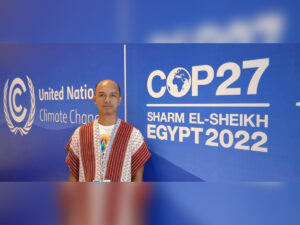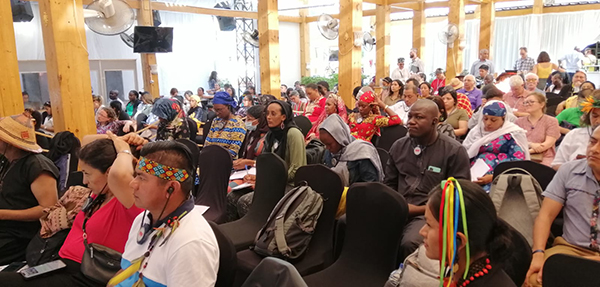A COP of many firsts but of mounting Indigenous determination

It’s my first time coming to Egypt, my first time to be stranded for one night in another country, my first time to attend a big UN conference, and everything is an overwhelming day to day of excitement and discovery.
This COP is also my first time to be in an international gathering of Indigenous Peoples. From the Sami people of the Arctic, from the African plains and forests, from the rain forests of Amazon in Latin America to the small islands of the Pacific, the tapestry of diverse local communities and Indigenous Peoples forms a colorful convergence of voices.
I came to Sharm El-Shiekh a week before the COP27 officially opened to join the Facilitative Working Group (FWG) meetings of the Local Communities and Indigenous Peoples Platform (LCIPP), which are supported and facilitated by the United Nations Framework Convention on Climate Change (UNFCCC). This engagement experience is both unique, because the FWG has a 50-50 state and Indigenous Peoples composition, and interesting in its workings. On one hand, you have the chain of technical articulation (which can be a maze of jargons) of the UNFCCC direction and on the other hand, you hear the on-the-ground realities endangering Indigenous communities.
This is also my baptism to the International Indigenous Peoples Forum on Climate Change (IIPFCC) caucus which is a more enjoyable crowd (no more state representatives!), and more singing and dancing from different Indigenous communities, something that I was missing in the FWG event. The caucus serves as the game plan huddle for the big Indigenous assembly (more than 200, the biggest in all IIPFCC COP caucus I heard) in relation to the climate conference’s agenda – loss and damages, climate finance, direct access to climate funds, mitigation, adaptation and agriculture. Even the opening statements and principles for the conference, including who will speak and how it must be impactfully delivered, is laboured in an intense exchange of views from hundreds of Indigenous representatives.

It’s my first encounter with the defenders of Sarayaku territory in Ecuador, the community leaders of the Brazilian Amazon, and the lively dances and songs of Maasai of Kenya. When the breeze and wave-like songs from Fiji, Kiribati and Marianas filled the whole caucus hall, which was literally at the Red Sea, I knew it was the sound of mother nature’s whispers.
And what’s not new in all of this?
The struggles for Indigenous lands and territories continues to sound like a reverberating chorus in all corners of the Indigenous world.
It takes on different faces and names – land grabbing from palm oil plantations and big agribusinesses, forest conservation that drives out forest dwellers, mining encroachment in the deep communities in the Amazon and mountains in Asia, fracking and oil pipelines. But this land dispossession, fueled by colonial and imperialist projects, is not new and continues today.
The stories are different but the same. And no matter how many times you hear them in the morning and afternoon meetings, day after day, the impact doesn’t fade any bit.
“We cannot wait anymore. What can we do about the lands lost due to rising seas? The coconut trees now drowned by the sea are not lying,” said a Fijian youth in one of the interventions. In many of the meetings, when Indigenous communities, especially from the Global South, share on how catastrophes contribute to their loss of lands, it’s clear to them that the rich countries are accountable. For them, climate change is not at all natural.
Looking back, the passionate pleas from the Indigenous leaders sounded more like brave declarations than resignation. It’s my first time at COP, but with the current direction the climate negotiation is taking, I think that this will not be the last I hear of these Indigenous stories.
By Paul Belisario, Assistant Global Coordinator for the International Indigenous Peoples Movement for Self Determination and Liberation, Philippines.








